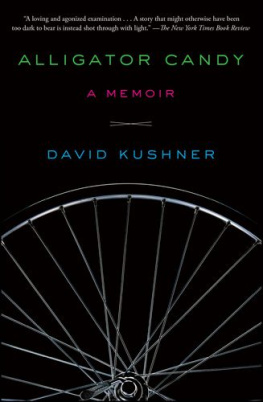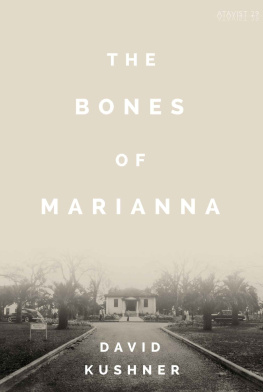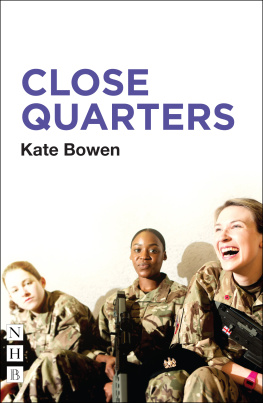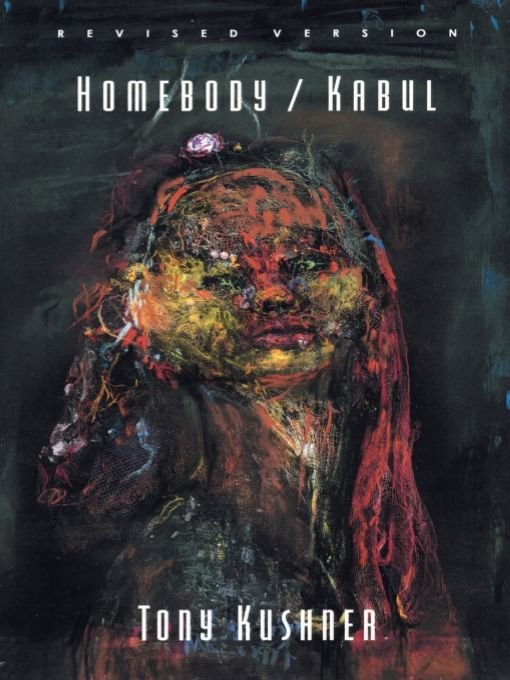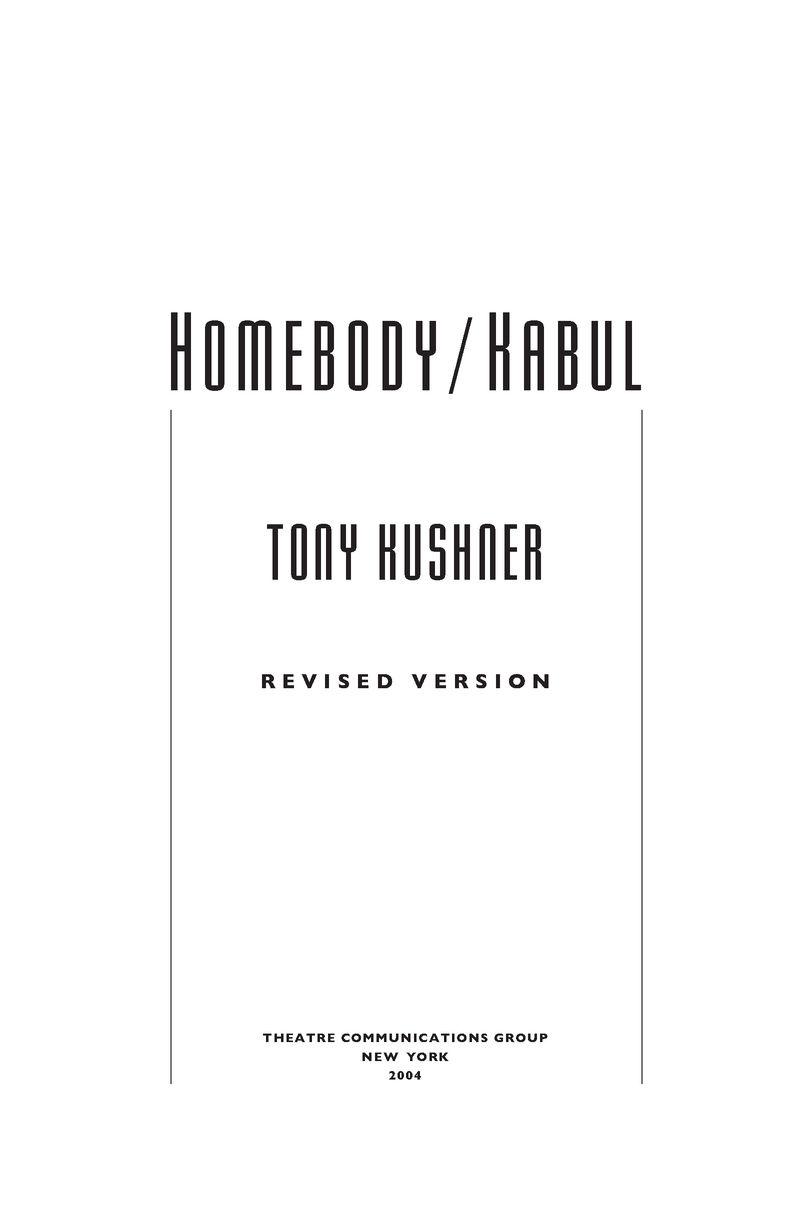Table of Contents
Of course, weve come to expect celestial wordplay and cosmically elevated thoughts from Kushner, author of A Bright Room Called Day, Slavs! and the Pulitzer Prizeand Tony Awardwinning opus Angels in America. Weve also come to expect plays that arent neat and tidy, that force you to engage rather than passively absorb and dont let you race home in time to catch the eleven oclock news... Few, if any, modern English-language playwrights of ideas can match Kushners intellectual sweep, his subtle but razor-edged sense of humor and his gift for peeling back layers of character until we finally see the naked human within. Even fewer can equal his fiery moral passion or sheer gutsiness. With Homebody/Kabul Kushner has dared to walk through a contemporary minefield, a dramatic terra incognita, without the benefit of a Baedeker to guide him, and emerged intact on the other side with a powerful story to tell.
REED JOHNSON,LOS ANGELES TIMES
Searing... Kushners use of language and ideas continues to make us think about the deeper questions... a masterful conglomerate of words, ideas and history.
MARY HOULIHAN,CHICAGO SUN-TIMES
Brilliant... this is a play for those who are interested in the root causes that preceded September 11, for those who can see through the fog of patriotism to the finer distinctions, who are finally ready to ask how on earth do we get out of this godforsaken place, who can bear to contemplate the thought that we have participated to some extent in our own tragedy.
JAMES RESTON, JR.,AMERICAN THEATRE
Kushner, a writer who is always on high alert to humanity as well as history, has, in the Homebody, created a characteran impassioned, fluttery, doomed characterwho is timeless as well as timely.
NANCY FRANKLIN,NEW YORKER
Homebody/Kabul is a welcome payoff for all whove been waiting a decade for a worthy follow-up to Kushners landmark Angels in America. Kushners plunge into the murky whirlpools of Afghan history, culture and politics is astonishing in its intellectual scope. It is also fierce in its dramatic engagement with complex realities and deeply humane. Kushner has led and provoked our minds as richly as hes engaged our sympathies.
ROBERT HURWITT,SAN FRANCISCO CHRONICLE
An extraordinary play... a deeply felt expansively ruminative drama.
PAUL TAYLOR,INDEPENDENT(LONDON)
At a couple of points in her awe-inspiring hour-long monologue that opens Homebody/Kabul, the title character insists, I love, love, love the world. In both its simplicity and complexity, the sentence shows why Kushner is Americas most interesting and important playwright. He writes in big, bold, often beautiful declarative sentences where many of his colleagues write between the lines, where what is said in parentheses, or unsaid in ellipses, supposedly speak volumes. His characters step out to remake the world, or at least their own broken selves, where others sit miserably in an interior chamber room, both psychologically and geographically. Homebody/Kabul is as fine a piece of American theater as anything since his last epic, Angels in America.
ED SIEGAL,BOSTON GLOBE
Dazzlingly written, insightful and timely. The playwrights generous viewpoint is liberal and progressive. His language is rich, his canvas is vast and his storytelling dynamic.
MICHAEL SOMMERS,NEWARK STAR-LEDGER
Homebody/Kabul is a rich and intelligent piece. PETER BROOK
This is a haunting and beautiful play in spite of its authors best efforts to ruin it.
JOHN PODHORETZ,WEEKLY STANDARD
BOOKS BY TONY KUSHNER AVAILABLE FROM TCG
ANGELS IN AMERICA, PART ONE:
MILLENNIUM APPROACHES
ANGELS IN AMERICA, PART TWO: PERESTROIKA
A BRIGHT ROOM CALLED DAY
CAROLINE, OR CHANGE
DEATH & TAXES: HYDRIOTAPHIA & OTHER PLAYS
A DYBBUK AND OTHER TALES OF THE SUPERNATURAL
Adapted from S. Ansky
With translations by Joachim Neugroschel
HOMEBODY/KABUL
THE ILLUSION
Freely adapted from Pierre Corneille
THINKING ABOUT THE LONGSTANDING PROBLEMS OF
VIRTUE AND HAPPINESS
Essays, a Play, Two Poems and a Prayer
For my dear friend Kika Markham,
who asked me for a monologue,
and in memory of my mother
Sylvia Deutscher Kushner
A FOREWORD
I saw the original production of Homebody/Kabul at New York Theatre Workshop in December of 2001. It was an uncanny experience. We were all of usand New Yorkers especiallystill reeling from the events of September the 11th, and here was this play, obviously written long before September of 2001, set in Afghanistan, expressing precisely the politics and conflicts that had suddenly burst onto the world stage. So much of the plays original reception was concentrated, quite naturally, on this strange confluence of events. One wondered, perhaps, if the play could survive its moment: would the sensationalism of its public birth at this critical historical moment overwhelm an experience of the play... as a PLAY? Could Homebody/Kabul receive a reading that concentrated on its intrinsic force as a human drama (instead of as a record of extrinsic world events)? (Did it want to? Should it?)
The fact that those questions arise reveals something central about the vision of the playwright, Tony Kushner. Tony is on record as describing the birth of the play as originating in his relationship with his mother and the experience of her death. He began the play as a monologue, written specifically for an actress-friend, delivered by the character of the Homebodya woman pinioned between irony and sorrow in her recognition of her deficiencies as a wife and a mother. Afghanistan enters into this domestic imagining as the site of escape: a country whose history is recounted by the Homebody from gleanings gained from an antiquated tour book. The Homebody is, herself, a tourist to her lifea woman guided in her intimate relationships by the conviction that all touch corrupts. Afghanistan represents the possibility of her own disappearancea loss of the domestic containment of marriage and motherhood, an escape from the language that both defines and isolates her. We watch her don her coat and walk away from the parlor of her English home and into the world of Afghanistan. We follow her into the streets of Kabul and in the same gesture, she disappears and we are left in the company of her husband and daughter who, like us, have arrived in Afghanistan in search of the Homebody. Inevitably, all of Afghanistan opens into view: locating this Western woman, a tourist in Afghanistan gone missing, brings us into contact with all of the currents shaping Afghani society: the personal becomes the political.
It is the ease with which this transposition is effectedfrom the personal to the political, from the local to the globalthat constitutes Tonys work as a playwright. That he began the play out of a desire to write for and about two women immediate and important to his life and arrived at that goal by creating a play remarkable for its political prescience speaks to how deeply the world lives in him and he in the world. Its as if writing about what he cares about, about that which is dear and close to him, will inevitably give rise to a deeply inquiring articulation of that in which we all live, in the political and social surrounding of our world, now.


